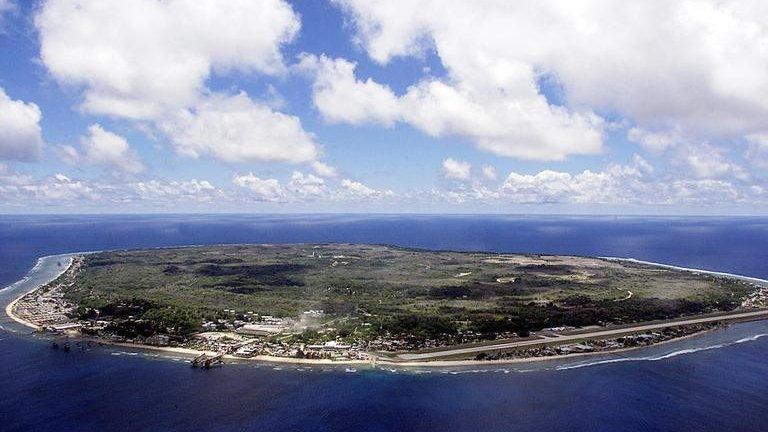Nauru profile - Timeline
- Published
A chronology of key events:
1798 - British navigator Captain John Fearn, sailing past Nauru from New Zealand to the China Seas, names it Pleasant Island.
1888 - Nauru annexed by Germany as part of the Marshall Islands Protectorate.
1900 - British company discovers phosphate on the island.
1906 - Phosphate mining begins. Britain divides profits with German firm.
1914 - Nauru seized by Australian troops.
1919 - League of Nations grants joint mandate to Australia, Great Britain and New Zealand.
1942-45 - Nauru occupied by the Japanese. Some 1,200 Nauruans - two-thirds of the population - deported to Micronesia to work as forced labourers. Five hundred die from starvation or bombing.
1947 - Nauru made UN trust territory under Australian administration.
Independence
1966 - Nauru Legislative Council elected.
1967 - Nauruans gain control of phosphate mining.
1968 - Independence. First president is Hammer DeRoburt.
1969 - Nauru becomes associate member of Commonwealth.
1989 - UN report on greenhouse effect warns Nauru might disappear beneath the sea in the 21st Century.
New challenges
1989 - Nauru sues Australia in the International Court of Justice for additional phosphate royalties dating back to trusteeship period, and compensation for mining damage.
1993 - Australia agrees to pay out-of-court settlement of $73m over 20 years. New Zealand and the UK agree to pay a one-time settlement of $8.2m each.
1999 - Nauru joins the United Nations.
2001 August - Australia pays Nauru to hold asylum seekers picked up trying to enter Australia illegally.
2002 June - Nauru holds some 1,000 asylum seekers on Australia's behalf. President Rene Harris says Canberra's promise that they would be gone by May has been broken.
Leadership changes
2003 January - Bernard Dowiyogo becomes president after a tussle for power with Rene Harris. Dowiyogo describes Nauru's situation as "critical".
2003 March - Dowiyogo agrees to US demands to wind-up Nauru's offshore banking industry amid money-laundering allegations. Shortly after this, Dowiyogo dies after heart surgery in the US.
2003 May - Ludwig Scotty elected as president but ousted in vote of no-confidence.
2003 August - Rene Harris re-elected as president.
2003 December - Some asylum seekers at Australia's offshore detention centre on Nauru stage a hunger strike.
Financial crisis
2004 April onwards - Country defaults on loan payments, its assets are placed in receivership in Australia.
2004 June - President Rene Harris loses vote of no confidence and resigns. Ludwig Scotty is elected president.
2004 July - Australia sends officials to take charge of Nauru's state finances.
2004 September - President Scotty sacks parliament after it fails to pass reform budget by deadline.
2004 October - General elections: Ludwig Scotty re-elected unopposed.
2005 May - Nauru agrees to restore diplomatic ties with Taiwan after a break of nearly three years. The move angers China, which accuses Nauru of being interested only in "material gains".
2005 October - Financial Action Task Force, set up to fight money laundering, removes Nauru from its list of uncooperative countries.
2005 December - Air Nauru's only aircraft is repossessed by a US bank after the country fails to make debt repayments.
2006 September - Australia sends Burmese asylum seekers to Nauru.
2007 March - Australia sends Sri Lankan asylum seekers to Nauru.
2007 December - President Scotty ousted in a no-confidence vote. Marcus Stephen chosen as replacement.
2008 February - Australia ends its policy of sending asylum seekers into detention on small Pacific islands, with the last refugees leaving Nauru.
2008 April - Government of President Stephen returned to office in snap elections, ending months of parliamentary deadlock over the budget.
2008 November - Finance Minister Kieran Keke announces plans to set up private bank to fill gap left by collapse of state Bank of Nauru in 1998. Australian banks have declined an invitation to provide banking services to the country.
Political deadlock
2010 March - Voters reject raft of constitutional changes aimed at stabilising government and strengthen human rights in referendum.
2010 April - Early parliamentary elections fail to produce outright winner. Mr Stephen's administration continues in caretaker role while negotiations continue.
2010 June - Parliamentary elections again fail to produce a clear winner.
2010 November - Parliament re-elects President Stephen for second three-year term under a coalition deal aimed at ending an eight-month political impasse.
2011 November - President Stephen resigns amid corruption allegations. MPs elect Freddy Pitcher to succeed him.
A week later, Mr Pitcher is ousted by a no-confidence vote, and Sprent Dabwido is elected president.
2012 June - President Dabwido sacks his cabinet, citing a legislative impasse.
2012 September - Australia opens a new detention camp for asylum-seekers on Nauru under its new offshore immigration policy.
2012 November - Rights group Amnesty describes Australia's camp for asylum-seekers on Nauru as appalling.
2012 November - Commonwealth Secretariat promises to help Nauru with funding to tackle climate change and rising sea levels.
2013 July - Police and security guards restore order after a full-scale riot breaks out at an Australian-run immigration detention camp on the island.
2015 January - Australian and Cambodian officials visit Nauru after signing a controversial refugees resettlement deal.
2016 August - The Guardian newspaper in London says leaked incident reports paint a picture of routine cruelty towards young asylum seekers on Nauru.
2016 October - The Nauru government labels the Australian Broadcasting Corporation "an embarrassment to journalism" following a damning report on the island's regional processing system.
2016 August - A senior UN official who visits Nauru describes Australia's treatment of asylum seekers in offshore detention centres as inhuman and degrading.
- Published14 September 2012
